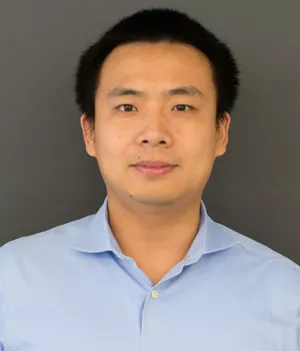
NSERC Grants awarded to UTM researchers
Professor Dehan Kong is one of 15 faculty members at U of T Mississauga to have been awarded a Natural Sciences and Engineering Research Council of Canada (NSERC) Discovery Grant (DG). He has the added distinction of being awarded a Discovery Accelerator Supplement, which means an extra $120,000 for the next three years to support his project, “Novel Statistical Methods with Application to Imaging Genetics.”
“Imaging genetics is a rapidly evolving field that integrates individual medical images with genetic information to assess the impact of genetic variation on brain function and structure,” says Kong.
“This NSERC funding will allow me to continue to build a research team made up of graduate and undergraduate students, as well as postdoctoral fellows. This project will develop new data analytic tools and algorithms to extract useful information from large-scale, imaging genetics data sets, which will enable us to better understand genetics, the brain and neurodegenerative diseases.”
UTM’s Vice-Principal, Research, Professor Bryan Stewart says this boost will go a long way to support fundamental research in the sciences at U of T Mississauga.
“The work being done and the range of research on this campus is outstanding, and so it completely buoys our research community here to see NSERC recognizing the excellence with this significant financial support,” says Stewart.
Along with Kong, the other UTM researchers awarded DGs include the following:
Department of Biology
- Professor Katharina Braeutigam for her project, “The relationship between genome, epigenome, and performance in long-live plants.”
- Professor Mary Cheng for her project, “Investigating the compartment-specific functions of G protein-coupled receptor kinase 2 in the central circadian clock of mice.”
- Professor Bailey McMeans for her project, “Seasonal changes in trophic interactions: physiological mechanisms and consequences for energy and contaminant flow in a Canadian Shield lake.”
- Professor Ian Orchard for his project, “Neurobiology of peptidergic and aminergic neurons in insects.”
- Professor Michael Phillips for his project, “Control of flux and adaptive responses at the interface of primary and secondary plant metabolism.”
Department of Chemical & Physical Sciences
- Professor Virgis Barzda for his project, “Nonlinear optical microscopy for ultrastructural bioimaging.”
- Professor Andrew Beharry for his project, “Photo-inducible Cell Ablation and Fluorescent Chemosensors for Chemical Biology.”
- Professor and Departmental Chair Claudiu Gradinaru for his project, “The physical underpinnings of intrinsically disordered proteins: conformations, dynamics and interactions.”
- Professor Jochen Halfar for his project, “Reconstructing centuries of Arctic climate and sea ice conditions using annually-banded coralline algae.”
- Professor David McMillen for his project, “Theoretical and experimental approaches in synthetic biology.”
- Professor Daniel Schulze for his project, “Origin of the subcontinental lithospheric mantle.”
Mathematical and Computational Sciences
- Professor Jacopo De Simoi for his project, “Fast–slow dynamical systems.”
- Professor Stanislav Volgushev for his project, “Distributional effects and computational challenges in modern data analysis.”
Department of Psychology
- Professor Keisuke Fukuda for his project, “EEG-based real-time monitoring and intervention of human memory.”
As well as the DG program, UTM researcher Professor Loren Martin was awarded a Research Tools and Instruments grant for over $147,000 to support “An advanced cell imaging multi-mode reader and cryostat for diverse research programs in the Department of Psychology.
This year an overall investment of $515 million will be made in NSERC Discovery Grants, graduate and postgraduate scholarships and fellowships across Canada. These investments provide researchers with funding to push the boundaries of innovation and discovery, and foster a culture of curiosity in Canadian science.
